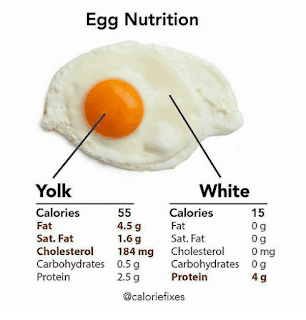Ah, the humble egg. Eat it by itself for breakfast, or whip it into a meringue masterpiece. And at 6 grams of protein per egg, it’s a great ingredient to keep in your vegetarian repertoire!
But how much do you really know about eggs? Like, what do the colors mean? And what is free-range, actually? We’re breaking down everything you need to know about eggs before we dive into the egg-cellent recipes this week!
Eggs have been recognized as one of the best bodybuilding foods. Rich in protein, low in everything else, if you skip the yolks, and healthy when cooked in a variety of delicious recipes. However, what does supplementing with eggs look like?
- AA Eggs: Have a small air pocket with a white that stands well around the yolk
- A Eggs: May have a larger air pocket and a thinner egg white
- B Eggs: The air pocket may be large with possible staining on the shell
What do egg labels mean?
You may see a variety of different labels slapped onto your carton of eggs. Here’s what they all mean!
Cage-Free: Hens are not confined to a cage; however, they may not be running happily around a field. Cage-free can constitute a wide array of chicken environments, from cramped in a warehouse to wandering around outside.
Free-Range: Hens are free to roam outside for at least part of the day.
Natural: The term “natural” is not regulated so this could mean anything the manufacturer wants it to mean.
Organic: The term “organic”, unlike “natural”, is mandated. Certified organic hens are fed organic vegetarian diets free from genetically-
modified foods or foods produced with pesticides. The hens do not receive antibiotics or vaccines, and are often also cage-free.
Pasteurized: Pasteurized eggs have been heated in their shells to 140 degrees F for 3.5 minutes. This kills many of the bacteria, namely Salmonella, making this a good option for those with weakened immune systems.
Why Should I Care About Egg Protein?
University research studies have shown that egg protein stimulates muscle growth in the body and boosts the creation of protein. This is probably because of the large concentrations of leucine, around 9%. Leucine is an essential, branch chain amino acid and it’s the acid that takes care of synthesis stimulation when it comes to muscle mass in the after-meal period. Not a lot of things have more leucine than an egg – pure WHEY protein being one of them.
Eggs have an incredibly high percentage of leucine, anywhere from 10 to 20 percent more than other sources. Also, egg proteins have a much more anabolic effect on the body than soy or wheat protein. It even beat them in the university study, where people who took egg protein increased their body mass much more than the people who took the other two proteins, even when they had the same amount.
When you eat an egg, your body practically absorbs all of the contents and after eating one, your body gets a surge in plasma amino acids, which have an effect on the muscles themselves. Muscles are vulnerable when it comes to blood amino acid levels and so they grow even stronger than before, with amazing speed and consistency.our food intake in the short term.
So, if you want to lose some body fat, you should focus on eggs a little bit more, especially if you want to feel full most of the time. Eating egg protein has a lot more benefits though – it has a lot of macronutrients, as well as vitamins and minerals. All of these components provide a substantial boost to the overall healthiness of the egg.
So When Should I Eat Egg Protein?
How much of the stuff you eat will be egg protein is up to you, but there are of course way to calculate the needed amount. Factors in this equation are things like body weight, protein intake, amount of other protein food eaten etc. Because eggs have a lot of leucine, you don’t actually need to satisfy all of your leucine needs through eating tons of eggs – you can always measure and most of the time you will realize you don’t actually need that much.
If you weigh 200 pounds and you’re only eating egg protein, you will need anywhere from thirty to forty grams of it per day to maintain what you have and grow even more muscle mass. If you wanted to do the same but used soy instead of egg protein, you’d probably need about fifty grams of it for the same effect.
You can eat egg protein whenever you want and it will still have very positive effects. However, you will often see people consuming it before or after their exercises. McMaster University studies headed by Dr. Stuart Phillips showed that eating as little as five grams of egg protein after working out would boost your recovery time and protein synthesis speed. Don’t clap yet though – the best results of the study were those people who had twenty to forty grams of egg protein daily.
Eggs go through your system really quickly, so in order to slow down the absorption process, supplement companies have put egg protein and whey in combination with casein and other slowly-absorbing protein. What they’re trying to do is make a powder that will provide a steady protein release into your blood flow. It’s unknown if this actually does any good.


